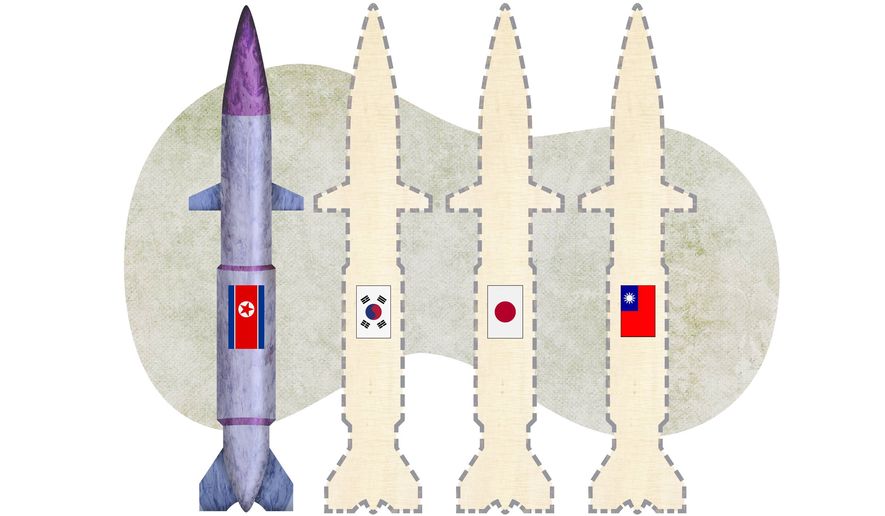OPINION:
Since Kim Jong-un took over from his father in December 2011 as the supreme leader, the nuclear threat from North Korea has increased exponentially. Over this five-year period, North Korea has conducted four progressively larger nuclear tests and more than 50 ballistic missile launches. In 2016 alone, North Korea conducted two nuclear tests and 25 missile launches, to include a June 2016 successful test of its Musudan Intermediate Range Ballistic missile, with a range of 4000 kilometers, and an August 2016 successful submarine-launched ballistic missile, with a range of 1000 kilometers.
Kim Jong-un’s New Year’s address this year stated that North Korea will reach the final stages to test-launch an intercontinental ballistic missile (ICBM). The two known ICBM variants, the KN-08 and KN-14, are road mobile missiles, with ranges exceeding 9000 kilometers, thus capable of reaching the U.S. In March 2016, North Korea posted a YouTube video titled “Last Chance” that simulated a nuclear missile attack on Washington. They posted a similar video of a simulated attack on the presidential residence in South Korea.
Although routine threats from Pyongyang have become commonplace, we should not forget the 46 sailors killed when in 2010 North Korea sank a South Korean Navy corvette, or the 1987 detonation of a bomb planted by North Korea in Korean Air Flight 858, killing 115 passengers and crew members; or the 1983 assassination attempt on South Korean President Chun Doo-hwan, during an official visit to Yangon, when 21 officials in his delegation were killed by three North Korean agents. There were other instances of violence perpetrated by the North, but my point is that North Korea’s nuclear and missile programs need to be halted soonest, with the goal of eventual comprehensive denuclearization, ensuring that there is a process in place to ensure that these weapons of mass destruction are never purposely or accidentally deployed and activated.
We are at a tipping point with a North Korea that possesses nuclear weapons and is in the process of miniaturizing those weapons to fit on the tip of a missile delivery system. Currently, North Korea has this capability in East Asia and therefore is an existential nuclear threat to South Korea and Japan, our two closest allies in East Asia. Eventually, with a flight tested ICBM, North Korea will be an existential nuclear threat to the U.S. We should never permit this to happen.
Although negotiations with North Korea for the past 25 years have failed, it’s in everyone’s interest to determine if negotiations with North Korea to initially halt their nuclear and missile programs and cease the production of fissile material is worth pursuing. Halting these programs and ensuring that North Korea does not test launch the ICBM is in our immediate interest. If successful, this could be the first step in a process to determine if and how comprehensive denuclearization with North Korea can be secured. Negotiations will also permit North Korea to present its own list of demands, to include their interest in a peace treaty, sanctions relief and a discussion of U.S.- South Korea joint military exercises. Movement on any of these issues could be the incentive necessary to get North Korea to halt its ongoing nuclear and missile programs and to engage in a broader denuclearization dialogue.
If a negotiated path to resolving these issues proves impossible, then North Korea has to understand that the U.S., in partnership with South Korea and Japan, and in consultation with China and Russia, will intensify its joint military exercises with South Korea, deploy additional missile defense capabilities to the region and intensify intelligence sharing and other cooperative measures between the U.S., South Korea and Japan.
Failure to get North Korea to ultimately dismantle its nuclear program will have profound proliferation consequences for the region. In addition to the possibility of a North Korea, hurting because of sanctions and in need of cash, selling nuclear materials or nuclear know how to state and non-state actors for cash, it’s obvious to me, having just returned from discussions with officials in South Korea, that South Korea eventually will seek its own nuclear weapons capability, if North Korea retains nuclear weapons. I believe Japan, also, will seek its own nuclear weapons capabilities if North Korea retains nuclear weapons. Both countries appreciate the extended nuclear deterrence the U.S. provides, but when confronted with a nuclear North Korea, they eventually will want their own so-called nuclear deterrent. Eventually, other countries in the region, to include Taiwan, will move to acquire nuclear weapons for deterrence purposes, in response to a nuclear North Korea.
Given the progress North Korea has made over the past five years with their nuclear and missile programs, and given the prospect of a North Korea that could quickly become an existential nuclear threat to the U.S., a comprehensive strategy for dealing with a nuclear North Korea is necessary. A negotiated settlement that initially seeks to halt its nuclear and missile programs and fissile material production could prove successful, especially now, with a new administration in Washington. If negotiations again are unsuccessful, the U.S., working with its allies and partners, has many options for dealing with a belligerent nuclear North Korea.
• Joseph R. DeTrani is the president of the Daniel Morgan Graduate School of National Security. He formerly was the special envoy for negotiations with North Korea and the director of the National Counterproliferation Center. The views are the authors own.




Please read our comment policy before commenting.